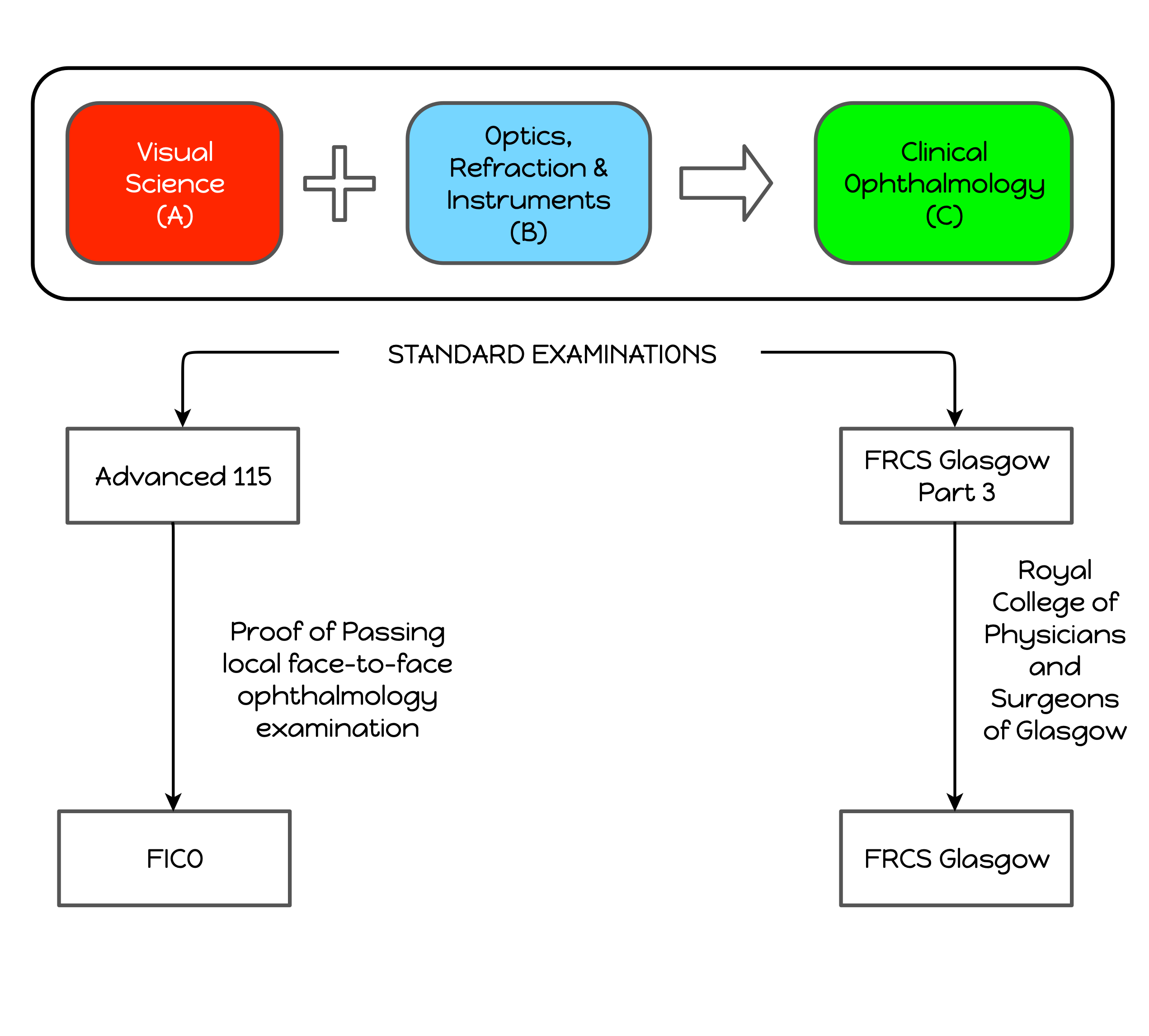The International Council of Ophthalmology examinations are an internationally recognized way of testing fundamental and clinical Ophthalmology. Clearing all parts of the examination offers the acronym FICO - Fellow of the International Council of Ophthalmology to the ophthalmologist, and an opportunity to apply for several international fellowships. Candidates with Distinction or Merit are assured of national and international recognition with an increased chance of ICO fellowships. It is a good idea to plan the examinations with parts of your residency to complement learning in both these areas.
Examination Structure
The ICO examinations are conducted in parts. Clearing Part A- Visual sciences and Part B- Optics, Refraction and Instruments allows one to appear for Part C- Clinical Ophthalmology. These are the Standard examinations. Clearing these 3 parts enables one to appear for the Advanced 115 Examination to become a Fellow of the International Council of Ophthalmology. Clearing the Standard examinations also allows one to bypass the first two parts of FRCS Glasgow examinations and directly appear for the clinical FRCS Glasgow examination.
Planning the examinations

Part A - It is best to give the Visual Sciences examination in the beginning of residency (October/ March) as this tests MBBS knowledge which is still fresh at this stage. I gave the examination in my second year of residency but in hindsight I realized it is best given earlier. This examination involves a lot of facts and requires revision. The later on it is planned in residency, the more difficult it gets to read and recollect Microbiology, Pathology, Genetics, Biochemistry, Statistics and general Anatomy and Physiology.
Books : Basic Sciences in Ophthalmology: A Self Assessment Text by John Ferris, American Academy of Ophthalmology (AAO) series , Anatomy and Physiology of the Eye by Dr. AK Khuranna.
Examination Pattern - 120 multiple-choice questions single best answer type, no negative marking. Total time - 3 hours.
Part B - Optics, refraction and Instruments can be planned in the latter half of first year or the second year as this will allow you more time to understand the subject and have one part of Ophthalmology done with, for your final examinations.
Books: Clinical Optics by Elkington is the best book to prepare for this examination and is very helpful for DNB final examinations too - the line diagrams are easy to interpret and recreate. Chua Optics MCQs can be found online and are a good way to practice solving questions. Theory and Practice of Optics and Refraction by Dr AK Khurana and Duke-Elder's Practice of Refraction are great books to consolidate the topics with maximal understanding.
Examination Pattern - 60 multiple-choice questions single best answer type, no negative marking. Total time - 1.5 hours.
Earlier the ICO used to give concessions for applying for Part 1 A and B together, and in groups - both of which no longer exist, so it is best to plan the examination when you feel most prepared and target one examination at a time if your schedules are hectic.
Part C - Clinical Ophthalmology is in my opinion the easiest examination to give when attempted after residency final theory examinations. I gave this examination in March, 3 months after the DNB final theory examinations - so the reading had already been done and the preparation involved mainly solving MCQs. This examination also prepares you better for the OSCE component of the DNB practical examination and helps stay in touch with the subject which gets increasingly difficult after theory examinations are over.
Books - Kanski’s Clinical Ophthalmology for text and images, American Academy of Ophthalmology series and standard Ophthalmology subspecialty books. To practice MCQs - ProVision 5, Review Questions in Ophthalmology by Kenneth Chern and The Massachusetts Eye and Ear Infirmary Review Manual for Ophthalmology.
Examination Pattern - 200 multiple-choice questions single best answer type, no negative marking. Total time - 4 hours.
Advanced 115 Examination - This examination tests essentially the same knowledge as the Clinical examination and does not require additional reading. The first 10 questions are of the extended matching type and require some practice. Appearing for this last examination after MS/DNB practical examinations is a good idea - it falls in the period when you are starting work as a senior resident or awaiting results and applying for fellowships so you have adequate time to prepare.
Examination Pattern - 10 Extended Matching questions and 75 multiple-choice questions single best answer type, no negative marking. Total time - 3 hours.
Take aways
As the popular quote goes, ‘Well planned is half done.’
Proper planning is the first step to executing a task. It helps to have a mentor who has appeared for the examinations to guide you with your preparation. Here I would like to acknowledge Dr. Karan Nathani, ex-Cornea fellow at Sankara Nethralaya for guiding me when I was appearing for the examinations. Getting in touch with seniors is the best way to learn from their experiences and decide what will work best for you. I hope my view helps residents in planning these examinations in a way that best maximizes learning. There is no fixed timeline to giving these examinations. Appear for them at a time when your schedule allows you adequate time to prepare and assess the knowledge you have at the phase of residency you are in, and you are sure to do well. My best wishes to you!
